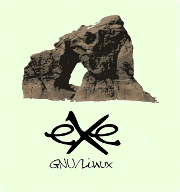.
EXE GNU/LINUX (Devuan GNU/Linux with Trinity Desktop)
Exe GNU/Linux (originating from Exmouth, in south-west England) is a "Live Linux image" preconfigured with a selection of applications for general desktop use. The image, written to CD or USB, may be used to start almost any computer with an Intel or AMD processor and runs as a complete operating system..
A fixed disk installation can be done from the "live" session. This can replace Microsoft Windows (or other OS) or install as a dual-boot configuration.
The core system is a Devuan GNU/Linux base. Previous versions were based on Debian. Trinity Desktop Environment (TDE) is preinstalled. Please note, this is not an "official" Devuan nor TDE project.
Included are various "system rescue" software tools and a small number of additional custom scripts and applications, e.g. the installer. Use and administration of Exe GNU/Linux is generally the same as official Devuan. Most Debian documentation and wiki articles also apply except that Debian's "systemd" is not used. See "References" further down this page.
No non-free software is included. Some wireless devices and other hardware components may need proprietary firmware. Solutions are very well documented at https://wiki.debian.org/ .
Exe GNU/Linux images are available in 32- and 64-bit versions and are sized 650-700M. They may be obtained from the "Current Downloads" link on the left of this page.
.
#############################################################################
.
PREPARING THE IMAGE
The image should be written in "DAO" (disk-at-once) mode in your CD writing application.
Performance will be much faster fom USB. The image can be written to a USB drive using "dd" from another operating system. This method will completely overwrite the drive.
The live image includes two "non-destructive" USB installers, available from the "System" menu: exegnu2usb and (newer and with more advanced options) refracta2usb, which may be used from a CD live session or from a subsequent fixed-disk installation.
.
NETWORKING
"Wicd" and "Ceni", available from the "Internet" menu, can assist network configuration. Wired ethernet connections should mostly be configured automatically. Some wireless devices may require non-free firmware.
Wireless device info: http://wiki.debian.org/WiFi
.
LOCAL DISK PARTITIONS
Local disk partitions are not automatically accessable in the live session. They may be manually mounted from a user terminal. Example for partition sda1:
"pmount sda1" (no quotes)
It should then be mounted at /media/sda1
For permanent or automatic configuration in an installation, "Disk Manager" is available from the "system" menu.
.
HARD DISK INSTALLATION:
Preferably, prepare in advance the install partition (at least 4GB and formatted to ext3 or ext4) and a swap partition (1-2x the machine's RAM size and formatted linux-swap). The gparted partition editor may be used to do this. A swap file in the root file system can be used instead of a separate partition, the installer will configure it if required.
An existing Windows system must be properly shut down (not in hibernation mode). Partitions needing to be shrunk should first be defragmented. Newer machines with UEFI boot mechanism must have "Secure Boot" disabled.
Start "ExeGNU Installer" from the "System" menu (or desktop icon). The installer will (optionally) place the "Grub" bootloader in the installation disk. This should autodetect and configure in a boot menu any existing operating system(s).
Alternative installer "Refractainstaller" is also available from the "system" menu. This works similarly but has some more advanced options, e.g. disk encryption.
Installation time can be as little as 5 minutes on a fast machine.
.
#############################################################################
.
References:
http://exegnulinux.net/
https://devuan.org/
https://wiki.debian.org/
https://www.trinitydesktop.org/
Special thanks to fsmithred and the Refracta project http://www.ibiblio.org/refracta/ for inspiration, forum discussion and some code and software tools used here.
Exe GNU/Linux isGPL licenced free software. Use at your own risk, there are no guarantees.
Please note this documentation is (mostly) correct only at the time of writing.
Thank you for testing Exe GNU/Linux.
David Hare
